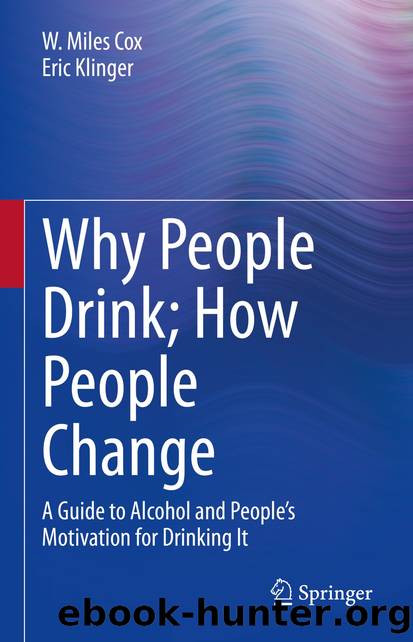Why People Drink; How People Change by W. Miles Cox & Eric Klinger

Author:W. Miles Cox & Eric Klinger
Language: eng
Format: epub
ISBN: 9783030939281
Publisher: Springer International Publishing
Depression, Rumination, and Alcohol Use
Besides depression feeling bad, one frequent part of it may be especially important in getting depressed individuals to drink: rumination. Rumination means spontaneously thinking about something repeatedly over time without particularly intending to do anything about it. Oneâs thoughts keep coming back to the same topic. That, in turn, tends to increase the periods of depression, because spontaneous thoughts tend to be about oneâs current concerns, including failing goal pursuits, which are also what presumably underlie the depression.
That is, current concerns are about oneâs goals. If the person is depressed, that strongly suggests that some of the goal pursuits are not going well. Thinking about that keeps reminding the person of failure, whether the failure is possible, expected, or actual. Rumination can also increase a personâs level of stress, a level reflected not only in unpleasant subjective emotions but also in the bodyâs physical functioning, such as the heart rate increasing and staying increased longer (Papousek et al., 2017) or the adrenal gland producing more of the stress hormone cortisol (Zoccola et al., 2008; Zoccola & Dickerson, 2015).
Recent research with veterans of American military service sheds additional light on this (Heggeness et al., 2021). These veterans had reported to a mental health clinic at a US Veterans Administration Medical Center. There was, as expected, a close relationship between how depressed they were and how much alcohol they drank. As we have seen, a common part of being depressed is ruminating, in the sense of repeatedly thinking about the events one is depressed about and wallowing in the emotions associated with what went wrong. Among the depressed veterans in the 2021 research by Heggeness et al., the more the veterans ruminated, the more alcohol they also consumed. In other words, it was mainly the rumination part of their depression that was associated with the amount they drank.
However, following previous work on rumination (Treynor et al., 2003), Heggeness et al. (2021) made a distinction between two kinds of rumination. One kind keeps replaying the images and emotions associated with particular circumstances (brooding), including self-doubts. In the other kind of rumination, the depressed individual is also contemplating possible reasons for and solutions to the depressing circumstances (reflective pondering). Insofar as the pondering leads to insights into the problem and perhaps even solutions to it, rumination can, of course, be useful for patients, and it can reduce the emotional pain. Indeed, other research (Sevcikova et al., 2020) found that the amount of problem-solving rumination in clinically depressed individuals at Week 1 of observing them was associated with patients having fewer depressive symptoms at Week 5. This study excluded patients with a recent history of substance use other than their prescribed medications; hence, it could not report how problem-solving rumination was related to alcohol or other substance use. However, the study by Heggeness et al. found that patientsâ depression that was marked by reflective pondering was positively related to alcohol misuse (as measured by self-report scores on the Alcohol Use Disorders Identification Test [AUDIT ]).
Download
This site does not store any files on its server. We only index and link to content provided by other sites. Please contact the content providers to delete copyright contents if any and email us, we'll remove relevant links or contents immediately.
Introduction to Social Work Practice : A Practical Workbook by Herschel Knapp(265)
How Data Happened by Unknown(243)
Selective Oxidation Catalysts Obtained by the Immobilization of Iron (III) Porphyrins on Layered Hydroxide Salts by Fernando Wypych Shirley Nakagaki & Guilherme Sippel Machado(222)
Global Health Governance and Commercialisation of Public Health in India by Anuj Kapilashrami Rama V. Baru(197)
Unmasked by Emily Mendenhall(169)
Curing Cancerphobia by David Ropeik(154)
The Pandemic Divide by Gwendolyn L. Wright Lucas Hubbard and William A. Darity Jr(138)
Feminist Global Health Security by Clare Wenham(133)
FALSE PANDEMICS: ARGUMENTS AGAINST THE RULE OF FEAR by Wolfgang Wodarg(130)
Restoring Quality Health Care by Scott W. Atlas(129)
The Making of a Pandemic: Social, Political, and Psychological Perspectives on Covid-19 by John Ehrenreich(126)
Pandemic India by Arnold David;(124)
Oversight and Review of Clinical Gene Transfer Protocols: Assessing the Role of the Recombinant DNA Advisory Committee by Rebecca N. Koehler(122)
Transforming Health Care Scheduling and Access: Getting to Now by Gary Kaplan(122)
Insane Society: A Sociology of Mental Health by Peter Morrall(112)
Into Africa, Out of Academia by Kwan Kew Lai(111)
Risk Communication and Infectious Diseases in an Age of Digital Media by Anat Gesser-Edelsburg Yaffa Shir-Raz(111)
The Metropolitan Academic Medical Center by David E. Rogers Eli Ginzberg(109)
Social Work in a Glocalised World by Mona Livholts Lia Bryant(108)
